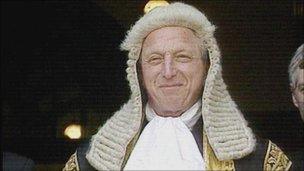Lord Woolf warning over UK Bill of Rights
- Published

Lord Woolf said it would be hard to adhere to two separate conventions on human rights
An ex-Law Lord has warned of conflicts between the European Convention on Human Rights and the government's proposed British Bill of Rights.
Lord Woolf said the UK faced a "stark choice" between accepting European court rulings or leaving the system.
The government is looking at a Bill of Rights following rows with Europe over prisoner voting and sex offenders.
It insists this will not undermine the European Convention but Lord Woolf warned of "complication".
The comments by Lord Woolf, Lord Chief Justice from 2000 to 2005, follow an outcry over the European Court of Human Rights' ruling that serving prisoners should be allowed to vote.
The House of Commons voted to keep the ban on prisoners voting earlier this month - although the vote is not binding.
The UK Supreme Court has also recently ruled that sex offenders in England and Wales can appeal against having to register with the police for life, arguing that this has to be the case under the European Convention on Human Rights.
'Virtually impossible'
At prime minister's questions last week, David Cameron called this decision "offensive" and confirmed that a commission looking into a British Bill of Rights - which was in the coalition agreement - would be set up soon.
On Sunday, Justice Secretary Ken Clarke said the UK government would continue to adhere to rulings from the Strasbourg-based European Court of Human Rights.
But he said he would seek to kick-start reform to balance its relations with national courts when the UK takes over the chairmanship of the Council of Europe in November.
Lord Woolf told BBC Radio 4's Today programme: "We have got a stark option: either we accept the European Convention, or we don't accept it and decide to leave the Council of Europe.
"It's very difficult to do what Mr Clarke indicated he would like to do when he's chairman of the relevant body, because there are 47 signatories in Europe which are signatories to the European Convention as well as ourselves. To try and amend that is a virtually impossible task."
He also said: "If you have a further convention - a British convention [the Bill of Rights] - there's going to be a complication in the position, because you're going to have two conventions to which the courts are going to have a regard."
The commission on a British Bill of Rights will be jointly chaired by Mr Clarke and Deputy Prime Minister Nick Clegg.
Lord Woolf said: "I don't see any problem about the commission that is being set up and I was very relieved Mr Clarke indicated there would be no question of us withdrawing form the European Council and the European Convention on Human Rights."
Shami Chakrabarti, director of the human rights group Liberty, said: "We have a Bill of Rights in this country. It's called the Human Rights Act and is thoroughly British, European and universal in its values.
"It protects all of us from the whims of politicians and, when the current frenzy of misinformation has died down, voters will worry about MPs who seek to put themselves above the law."
- Published16 February 2011
- Published16 February 2011
- Published10 February 2011
- Published25 January 2011